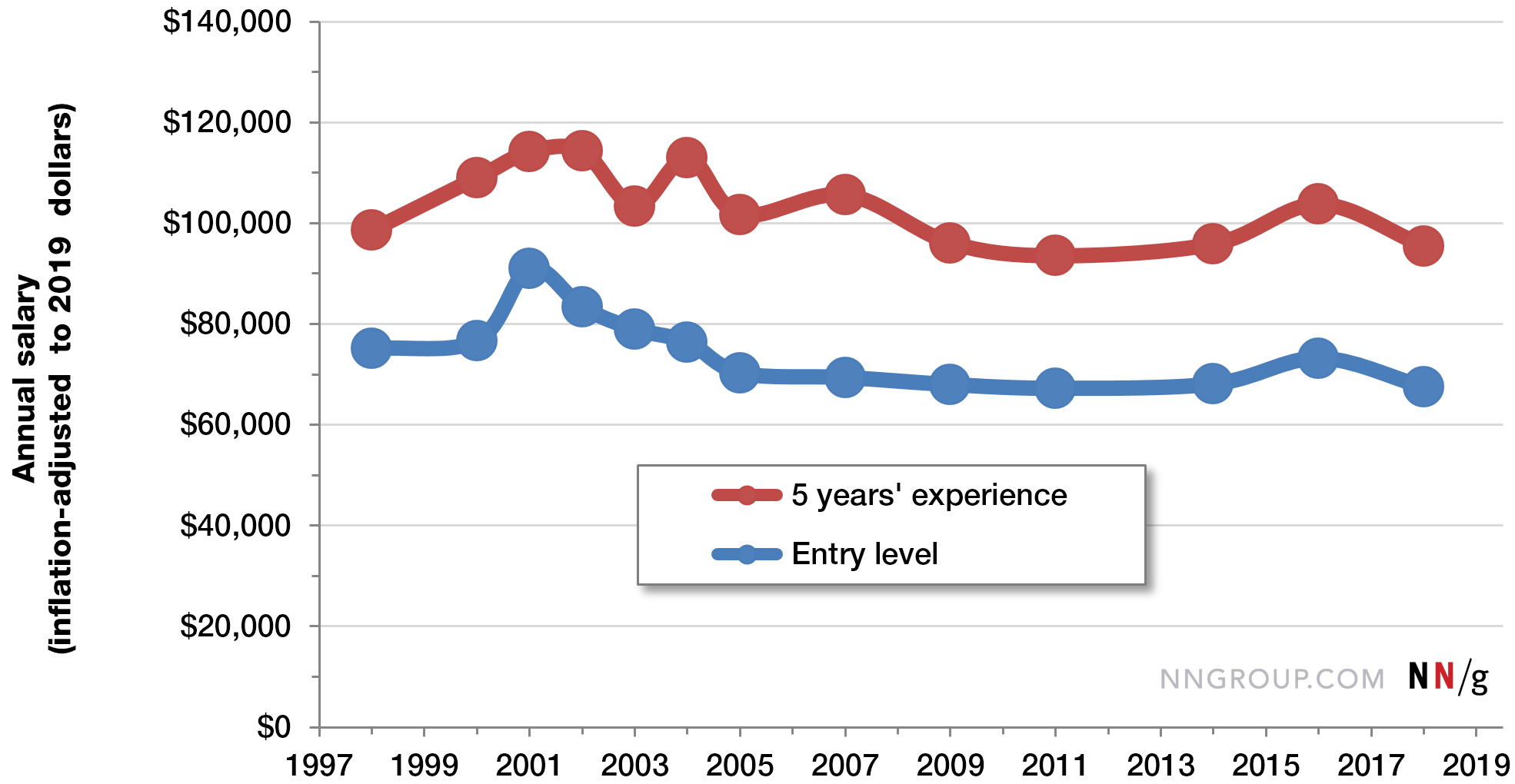User experience professionals' salaries seem to have stabilized following the wild ride of the dot-com bubble around 2000. Many salary surveys have been conducted since 1998, but the real picture only emerges once you unify the findings and consider the data across studies.
The following chart shows the average annual salary for two types of UX professionals in the United States across the last 20 years:
- A person with 5 years' experience working as a UX professional.
- An entry-level person with essentially no industry work experience.

These curves don't plot the raw numbers from the individual studies. In each case, I've taken the original findings and run them through mathematical models to clean up some of the methodological uncertainties inherent in salary surveys. Despite these efforts, my two curves are still only approximations. For example, it was definitely not the case that experienced staff temporarily had higher compensation in 2004 than in 2003 and 2005. That bump on the red curve is a study artifact that my calculations didn't remove.
Similarly, there was a small bumb in both curves in 2016, which was likely also a statistical artifact. It's remarkable how flat UX salaries have been since 2005, after adjusting for inflation.
General Trends
Rather than obsess over individual data points, it's better to look at the chart's bigger trends. Several conclusions are clear:
- Entry-level staffers were paid unrealistically high salaries during the original dot-com bubble, when over-funded companies were desperate to hire any warm body that walked in the door.
- Experienced staffers were also paid more during the bubble, but their salaries have declined less in the years after 2001.
- As a result of the different trends for entry-level and experienced staff, the premium on experience has increased in recent years: in 2001 it was about $4,600 per year of experience, whereas now it's about $5,500 (both amounts inflation-adjusted to 2019).
On average, current entry-level salaries in 2019-dollars are about $67,000, and UX staffers with 5 years' professional experience earn about $95,000. (Salaries are lower outside the United States.)
It's interesting to note that entry level salaries held up pretty well during the 2008–2012 recession, whereas more experienced staff didn't do as well because the raises people received for each year's added experience were very small during this period. On the other hand, after the recovery in 2014, experienced UX people got a bit of their missing raises back, whereas starting salaries stayed the same.
The Value of Experience
The difference between new and experienced staff ought to be even larger. In the user experience field, skill is strongly dependent on experience. For example, university courses don't teach the details of how to correctly run a usability study. As a result, entry-level staffers typically need extensive mentoring before they can do a good job in practical projects.
Experience also dramatically increases a person's ability to infer underlying design flaws from observing user behavior. User behavior is remarkably consistent over the years. The more users you've seen, the more accurate your judgments and predictions of future user behavior. All these factors justify a substantial premium on UX experience.
A final trend responsible for downward pressure on entry-level salaries is the emergence of second-tier usability companies that serve clients with less-skilled staff based in low-salary countries. Such services can replace entry-level usability specialists much more easily than they can replace experienced pros.
The $6K/year experience premium applies during the first 5 years of a UX professionals' career. Later, the premium drops to $3K/year. This is reasonable, as the biggest performance gains come in the early years, when newly minted user experience specialists are disabused of bad habits from university and learn how to actually do the job in industry.
Somebody with 15 years' experience may be slightly better than somebody with 10 years' experience, but not by much. In contrast, somebody with 5 years' experience is almost infinitely better than an entry-level person, and somebody with 10 years' experience is somewhat better than the 5-year person.
(It should be said that having high value of additional experience for the first 10 years and low value of additional experience after 10 years is a general phenomen in most fields, so it's not just in UX that raises start high and then decline in later years. For most topics, once you have learned the important stuff, then adding new skills only compensates for that part of your old knowledge that has become obsolete, so your net sum of useful knowledge stays steady.)
The finding that salary growth is concentrated in the beginning of an individual's career is confirmed by a study by the Federal Reserve Bank of New York, which analyzed data from 8 million men in the United States. For the vast majority of employees, all income growth happened between the ages of 25 and 35. On average, income at age 55 was the same as income at age 35. Only the top 2% experienced salary growth after age 45. Because the Feds have to perform very coarse statistics based on the Social Security database, they can't know about people's career stages, only their age. Thus, we can't make an exact comparison between the US-wide data and the UX data. Still, the fact that many UX professionals continue to experience some small salary growth in the later stages of their careers would indicate that they belong to the top 2% of the population in the United States in terms of income growth potential.
Seen over the 20-year period from 1998 to 2018, UX salaries have been remarkably steady. If we disregard the bubble-induced bump around 2001, the long-term change is a trend toward slightly lower entry-level salaries. This difference is probably due to the fact that more and more universities are now pumping out graduates with some UX skills. Good UX people are still difficult to recruit, but at least there are more of them around these days.
We don't know how much UX Certification will boost somebody's salary, but it's definitely a way to demonstrate the experience that's known to be a strong salary-builder.





Share this article: